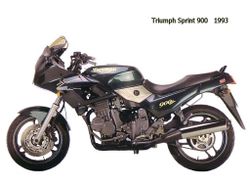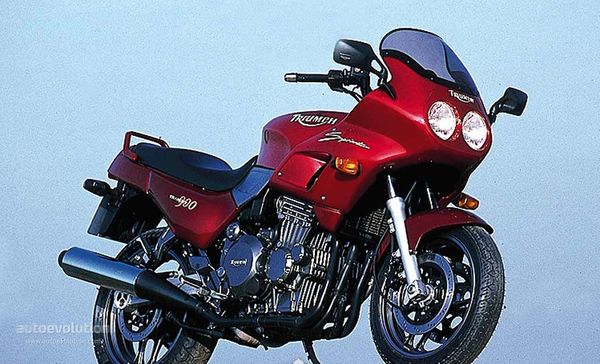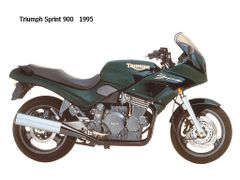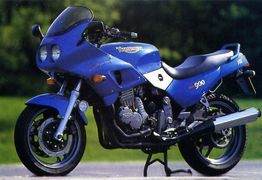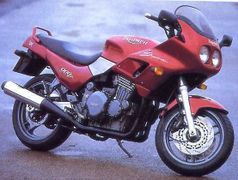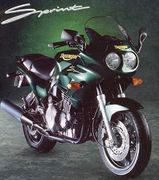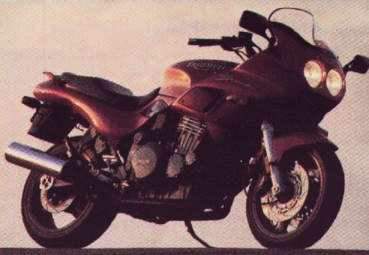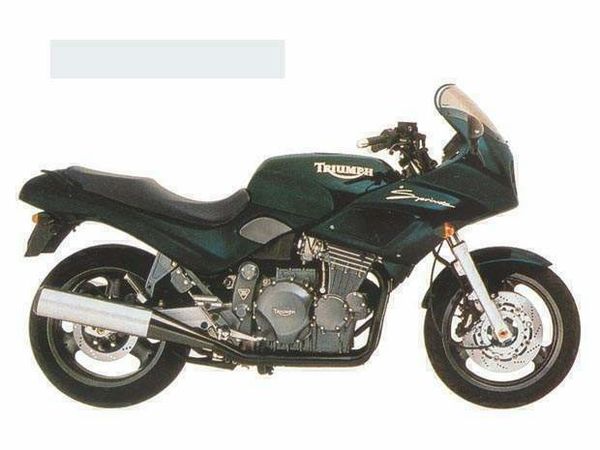Triumph Sprint 900: history, specs, pictures
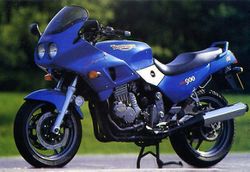 |
|
| Triumph Sprint 900 | |
| Manufacturer | |
|---|---|
| Production | 1994 - 1997 |
| Class | Sport touring |
| Engine | liquid-cooled, four-stroke, transverse three cylinder, 4-valve |
| Bore / Stroke | 76.2mm x 76.2mm |
| Compression ratio | 10.6:1 |
| Top Speed | 140 mph (225 km/h) |
| Horsepower | 98.97 HP (73.8 KW) @ 9500RPM |
| Torque | 58.27 ft/lbs (79.0 Nm) @ 6500RPM |
| Fuel System | 3 x 36mm flat side Mikuni CV, carburetor |
| Air Filter | K&N TB-9091 `95-98[1] |
| Spark Plug | NGK DPR8EA-9 |
| Battery | YUASA YB14LA-2 |
| Transmission | Gear box: 6-speed, manual Final Drive: chain |
| Final Drive | Chain: 530x110 |
| Front Sprocket | 17T |
| Rear Sprocket | 43T |
| Suspension | Front: 43mm telescopic forks Rear: tri-link single shock, adjustable for rebound damping and spring preload |
| Brakes | Front: 2x310mm discs, 4 piston calipers Rear: single 255mm disc, 2 piston caliper |
| Front Tire | 120/60 ZR17 |
| Rear Tire | 130/70 ZR18 |
| Seat Height | 30.71 inches (780 mm) |
| Weight | 473.99 pounds (215.0 Kg) (dry), 215.0 kg (wet) |
| Oil Filter | K&N KN-192[1] |
| Manuals | Service Manual |
The Triumph Sprint 900 was a liquid-cooled, four-stroke, transverse three cylinder, 4-valve Sport touring motorcycle produced by Triumph between 1994 and 1997. It could reach a top speed of 140 mph (225 km/h). Max torque was 58.27 ft/lbs (79.0 Nm) @ 6500 RPM. Claimed horsepower was 98.97 HP (73.8 KW) @ 9500 RPM.
Engine[edit | edit source]
The engine was a liquid cooled liquid-cooled, four-stroke, transverse three cylinder, 4-valve. A 76.2mm bore x 76.2mm stroke result in a displacement of just 885.0 cubic centimeters.
Drive[edit | edit source]
The bike has a 6-speed, manual transmission. Power was moderated via the wet multi-disc, manual.
Chassis[edit | edit source]
It came with a 120/60 ZR17 front tire and a 130/70 ZR18 rear tire. Stopping was achieved via 2x310mm discs, 4 piston calipers in the front and a single 255mm disc, 2 piston caliper in the rear. The front suspension was a 43mm telescopic forks while the rear was equipped with a tri-link single shock, adjustable for rebound damping and spring preload. The bike weighed just 473.99 pounds (215.0 Kg).
1993[edit | edit source]
1994 Triumph Sprint 900[edit | edit source]
The 1994 MY Triumph Sprint 900 is a cross between the naked Trident 900 and the fully-faired Trophy. Designed especially for fast motorway speeds, its half-fairing not only takes the grunt of the elements off the rider, it also helps with performance, being more aerodynamic than the Trident.
The two-wheeler sports a liquid-cooled, four-stroke, 885cc, transverse three cylinder that produces 99 horsepower and 78 Nm of torque. As all the other Triumph models of the era, it was built using the same modular design, meaning it handles like its siblings, being quite responsive at cornering, except maybe for slow-speed, sharp turns, where a smaller inseam rider might have to struggle a little with the bulk of the bike.
1995 Triumph Sprint 900[edit | edit source]
For riders who want sportbike-like performance, on a lightweight bike, yet still be protected from the elements, the 1995 MY Triumph Sprint 900 is a choice to take into serious consideration. The powerplant on this half-fairing bike can produce almost 100 horsepower and 78 Nm of torque, which is more than enough for a fun, highway run. The chassis, the same as all the other 900cc Triumph models, is rigid yet manageable enough to ensure smooth handling no matter how tight the bend.
Visually, since its rebirth in 1991, the British firm have shown an extraordinary attention to details and quality of finish, almost at the same level as the Germans from BMW. The Sprint is no exception from this, with well-drawn and defined curves from front to back, combined with some black engine accents and rims.
1996 Triumph Sprint 900[edit | edit source]
The 1996 MY Triumph Sprint 900 follows the Hinckley modular design, meaning it shares its engine and chassis with other models, such as the Trident 900 and the Daytona 900. But that is where the similarities end. The bodywork still allows the engine to seen in its full splendour, whereas the Brits added half-fairings to not only increase rider comfort, but also performance, the bike being more aerodynamic than the naked Trident. One might even call it a touring bike but that is not the case either, because of the engine, which was tweaked for sportbike-like performance, it feeling most comfortable in the high revs. Add to this the light weight of the bike, as opposed to the full-fledged tourer, the Daytona 900 and you get an all-round motorcycle and one of the most sought-over machines from Triumph.
1997 Triumph Sprint 900[edit | edit source]
When it comes to Triumph 900cc road motorcycles, one might think that he has a choice only between the naked Trident or the full-faired touring Daytona. Well, not anymore, because the Brits introduced the 1997 MY Sprint 900, which, in accordance with the modular design concept of Hinckley, shares the same engine and chassis with the aforementioned two models, but is more lightweight than the Daytona and has a half-fairing, as opposed to the Trident.
The result is a machine that feels right at home on the track, on the road and even on transcontinental hauls, Triumph succeeding in reaching a compromise between a lighter bike and a comfortable one.
In Media[edit | edit source]
References[edit | edit source]
- ↑ 1.0 1.1 2019 K&L Supply Co Catalog. K&L Supply Co. 2019.
| |||||||||||
